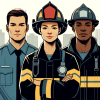When I first started as a Paramedic, I attached myself to other paramedics I trusted and knew could offer me knowledge and mentorship. Typically they had several years of service, extensive professionalism, a calm demeanor and a high level of competence. One gave me two simple pieces of advice that I still cherish to this day, “Treat every patient as if they could die in front of you (thus you will never be surprised when they do) and assume nothing, trust nobody and check everything.” I have found both statements to be essential in providing good emergency care in the field. However, the second part of the quote (assume nothing, trust nobody and check everything) I feel is a creed for success and has carried me through thousands of 911 calls. I’m not advocating mistrust between you and your partner or anybody else within your firehouse or ambulance. I’m saying that all medical information should be viewed with a degree of skepticism and run through common sense filters during your patient assessments. In the medical profession this is called a “second opinion.”
Assumptions can kill almost as fast as apathy. According to Angelo Donghia, “Assumption is the mother of all screw-ups.” When we assume the information we receive is correct without processing it, we put our patient’s at risk. When we stereotype our patients, omitting patient assessments and treatment based on assumptions, we potentially harm our patients. When we take actions based on assumption from previous patient encounters, we put our patients in jeopardy. For instance, the chronic once a week COPD patient that usually calls for shortness of breath, however this time is having cardiac chest pain. This patient deserves no assumptions and a fresh assessment perspective. During our medical workups, we need to question our patients to find truth and when we assess them, we need to find evidence. It’s evidence found through your assessment that drives patient care, not assumptions. “Assume nothing” is a first key step to good patient care.
Trust is earned. It’s closely related to reliability and evidence, and is accepted in various degrees. Some in your life are trustworthy. They are time tested and proven. In time crunches, such as those found during 911 calls, your patients require a quick evaluation for trust. Remember, your patients must be oriented to person, place, time and event before they can earn your most basic level of trust. Altered patients are not to be trusted and their information must be filtered. From there, questions can be tailored to find medically pertinent information and simultaneously allow for evaluation of trust. Start all patient interactions with minimal trust; let the patients earn your trust through assessments, scene evaluation and questioning. It is paramount to carefully evaluate your patients, bystanders and scenes. Your gut, intuition or intuitive nature will tell you if any are being evasive or less than trust worthy. Make sure to trust yourself, you are well trained and prepared for these situations. When things are adding up, the patients, bystanders and other EMS providers earn trust. It is essential that you are trustworthy as well, which is achieved through professionalism (an entirely separate discussion).
It’s vital that you “check everything.” Apathy and laziness have killed and harmed many patients. They have destroyed and shortened otherwise promising EMS/Firefighting careers. When we refuse to check everything, for whatever reason, we place our patients at risk. Even when paramedics provide the best patient care with the most thorough assessment, receiving physicians start from the top (or the beginning). Few instances exist where receiving physicians and nurses are not going to verify your story and treatment through evidence-based assessment and questioning.
Skepticism is important when evaluating information your patients are providing compared to what you find. Do your patient’s prescribed medications match the story that the first responders are telling you, versus the story your patient is telling you, versus what you are witnessing on the physical exam? Checking and rechecking the patient’s complaint against your physical findings and your course of treatment is just good practice. For instance, when caring for a pediatric patient, if your partner’s medication calculations exceed the common adult dose, you have a problem. Through a common sense evaluation process and a healthy degree of skepticism, you have successfully employed a practice that saved your patient’s life. Or, You are suspicious after responding to an elderly female patient who advises that she is “ok” and wishes to be placed back into bed after a ground level fall. During your evidence based physical exam and questioning you find a possible fractured wrist. The patient is not ok she just doesn’t want to go the hospital. Elderly folks can be weary of places where their relatives and friends have never returned (the hospital), or where they themselves have had bad experiences. These situations underscore the checks and balance system that occurs in your mind during your assessments. It’s not an adversarial approach, pitting one provider against another, it’s a little less-ego and what the patient deserves. When you are getting a report from a first responder, be respectful, listen, process the information and then confirm it through evidence-based assessment and questioning in your ambulance. Whether you are an EMT or Paramedic don’t be alarmed or take it personal when providers take reports from you and then confirm those findings with further repetitive patient questioning or assessment measures.
Your license (certificate) and professional integrity are always on the line. Don’t let apathy, assumptions laziness or ego hamper your actions. You will be held accountable for your actions as well as your omissions. Patients deserve your fresh and thorough evaluation. Make sure you give it to them.


